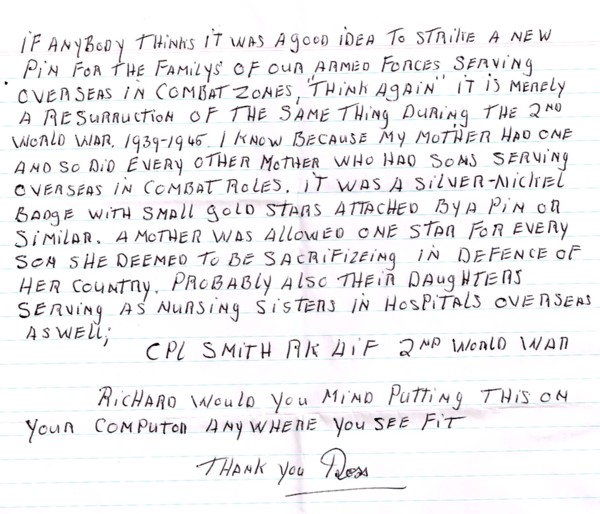Footnotes:
Family Service Pin

Americans
When Singapore fell to the Japanese our prime minister at the time, John Curtain, realising that the Japs would soon be on our doorstep, sent an urgent request to Winston Churchill for assistance. But England had their ‘backs to the wall’ and the request was denied. It was then that John Curtain made a speech to the Australian public saying from now on we must all look to America for our salvation. He also demanded that a large contingent of Australian troops, en-route from the Middle East to Burma to fight for England be immediately re-routed to defend Australia.
Also in 1942 the Yanks ‘hit our shores’, commanded by one flamboyant General Douglas MacArthur, to be used as a base area before being shipped to places like Guadalcanal and Saipan. Their arrival was very much welcomed by us because without them we would have very quickly ‘gone under’ to the Japanese. That was our initial response by all and sundry; but there were other benefits to be obtained, especially by the women who thought all their birthdays had come at once.
There was of course a lot of rivalry between the American and Australian servicemen, with the Aussies at a great disadvantage. First off there was the typical Australian soldier, shabbily dressed, six bob a day, rough as guts and twice as salty.
By contrast the girls had never seen anything like this before in their whole lives. The Yanks wore these magnificent tailored uniforms; chocolate and fawn in colour with nice brass buttons on the officers. A very nice American accent, well mannered, plenty of money and they knew how to treat a lady.
Then of course there were the sailors, also immaculate. We used to call them Gobs. Gobs was slang for mouth (everything is big in Texas). Then there was the Battle of Brisbane when two trainloads of Yanks and Aussies were temporarily side-tracked opposite each other just outside of Brisbane. At first there was friendly repartee which soon developed into a slanging match and then into open violence, when a couple of drunken GI’s started slinging about what they were going to do with our girlfriends while we were away in New Guinea. It was a real free-for-all in which several were killed and many injured before both the civilian and military police were able to restore order.
Ross Smith
